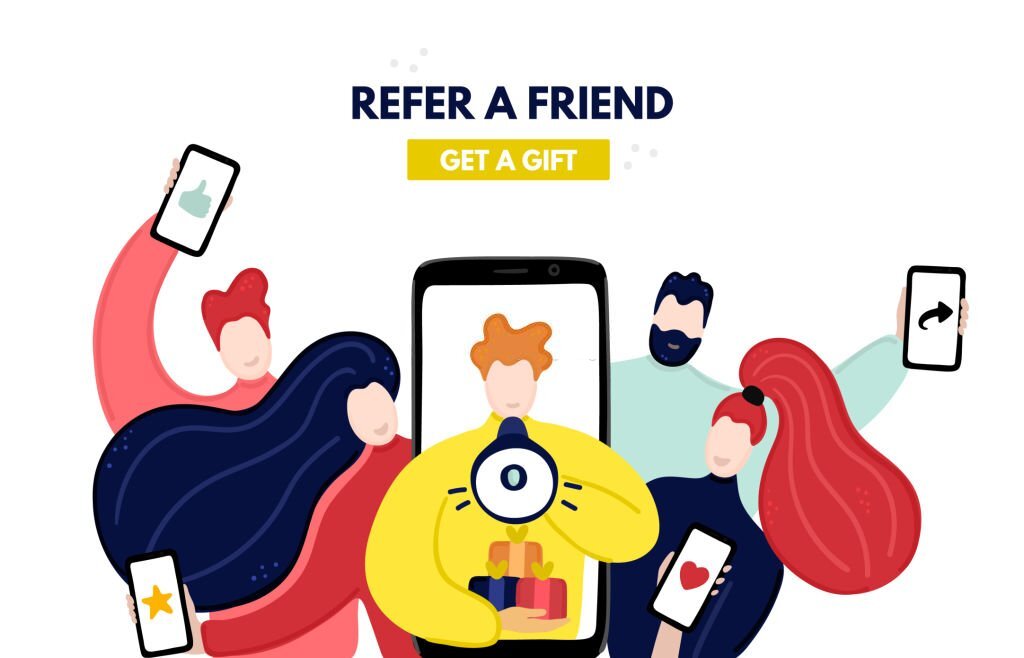Customer referrals are powerful. But did you know that referral marketing was one of the most effective marketing tools that you can use for your business? It’s true. Referral marketing boasts a conversion rate that’s 3-5X higher than other acquisition methods, and it brings with it an average of 25% more profit for your business. Not to mention customers that are 33% more loyal, and a ton of other benefits. In this post, we will go over what referral marketing is, how it can benefit your business, and how to create an effective referral marketing campaign so you can start enjoying the benefits of your referral program right away.
What is Referral Marketing?
Referral marketing is a growth marketing technique that relies on happy customers to spread the word about a product or service to their friends, family, and colleagues. While most word-of-mouth marketing strategies are hard to track, influence, and measure; a referral marketing strategy encourages and rewards the customer for allowing them to do so.
Referral marketing, when done correctly, is a free, potentially viral, and highly credible method of advertising. One good example of a successful referral marketing strategy would be T-Mobile’s $50 per referral program that encourages customers to earn an extra $500 per year for referring 10 friends.
Need help developing your referral marketing strategy? Give us a call now to discuss your project with one of our friendly team members!
What Are the Benefits of Referral Marketing?

What are the benefits of referral marketing? Well, for one, it’s free, and the conversion of referral leads is 30% higher than other channels. Referrals spend an average of 2 times more than other customers and have 3 times the potential to be repeat customers.
Here are some of the main benefits of referral marketing:
Target Loyal Customers
Putting your target customers first would make them feel special, empowering your most loyal customers to become brand advocates, and be recognized and rewarded at the same time.
Improve Visibility and Reputation
By using referral marketing, you establish your brand’s reputation because your customers become brand ambassadors, telling their friends and family about your brand. If you’ve already got an existing customer base, this sends your visibility and reputation through the roof!
Improved Conversion Rate
Referral marketing encourages customers to buy your products and services through word of mouth, social media, or other earned media types, engaging and driving prospects to become paying customers.
Increased Customer Engagement
In business, the most important thing is to connect with your target customers whenever and wherever possible. It’s important to establish a relationship with your target audience in referral programs since it enables you to use a relationship marketing strategy. Your customers will speak for you, allowing you to measure the performance of your campaign to see what media types and channels are working best for you.
Improved Customer Retention Rate
Through referral marketing programs, you can gain insight into the customer’s expectations and motivations, enabling you to build a long-term relationship. This results in customers staying with the company longer. New customer acquisition costs are higher than retaining existing ones, and customer retention is one of the main benefits of getting referrals.
Expand Market Reach
A successful referral marketing program can amplify your market reach quickly if it has the potential for growth. Your product or service would be preferred by the customer if you provided the right incentives; either personally or via social media. Your product or service’s market coverage would, however, increase dramatically when a celebrity or influencer endorsed it, so endorsements are great when you can get them.
Measure Customer Satisfaction
Referral marketing is a great tool for assessing customer satisfaction. Referral programs that generate a large number of referrals are proof that they are successful and customers are satisfied with them. The customer experience level should be improved if you don’t receive enough referrals. Find something or some way that would make your product or services seem like they just go above and beyond expectations.
User-Friendly Customization and Tweaking
Referral programs are often run through online referral platforms on social media. Users can easily customise and modify such platforms. This allows you to make necessary adjustments if you wish to implement a new strategy, make some changes, or run some tests.
Cost-effective Marketing Strategy
A significant part of the marketing cost can be reduced through referral marketing, which relies on word-of-mouth marketing. You must spend a lot more money promoting a product or brand to new customers than you must spend promoting it to existing customers. In contrast to marketing advertisements, customer referrals are highly persuasive.
Enable Word of Mouth
In addition to generating more leads, word-of-mouth marketing provides the ability and scalability to reach a wider audience, allowing you to leverage your social media channels more effectively.
How Does Referral Marketing Work?

So, how does referral marketing work? A referral marketing program may seem elusive at first, but it’s one of the easiest digital marketing strategies you could implement for your business:
First, you recruit partners, (affiliates) to tell their friends, or place links to your products or services on their blog or social media pages. Then, every time someone comes from one of their links, they make a commission, earn points, get free stuff, whatever you’ve decided to incentivize with.
However, while the concept of a referral marketing strategy seems simple, starting and running a successful referral marketing strategy can be a challenge, especially for business owners who already have too much to do. Assuming that you have an established customer base, you have to think about who affiliates will be, decide on the right rewards for your unique program, and set up a way to track their success.
Then, you have more to worry about, because you want your affiliates to have it as easy as possible. You have to put yourself in their shoes for this to decide if you’ll need rules, possibly training, in some cases even security measures, etc. Ideally, you want your referral marketing to be hackproof, easy for affiliates, and enticing enough to get people motivated to make some money with you.
This guide will give you everything you need to be successful at referral marketing:
What Types of Referral Programs Can I Use for My Strategy?
There are a few types of referral programs to consider for your referral marketing strategy. Referral programs can be direct, reputation-based, or incentivized. Here’s how the different types of referral programs work:
Direct Referral Programs
Direct referral programs make a simple and effective way to refer friends. Also known as refer-a-friend programs, direct referral programs are some of the most common types of referral programs because they make it easy to communicate offers to your existing customers and get them motivated to recommend your product or service, which in turn leads to new customers.
Reputation-Based Referral Programs
Reputation-based programs are mainly organic. If you have an amazing product and a strong brand reputation, these types of referrals will come naturally. If you want to take advantage of reputation-based referrals, you should invest conscious effort into building brand awareness and maintaining good relationships with your audience, so you can differentiate from your competition and acquire new customers.
Incentivized Referral Programs
Incentivized referral programs are the most popular type of referral program. Whether you choose to offer discounts on products or services or a cash kickback, these programs tend to perform better and always work.
Types of Rewards for Referral Programs
There are a few types of rewards, all of which work well for referral programs. Those types of rewards are fixed rewards, variable rewards, cash and credit rewards, and tier-based referral programs.
Fixed Reward Referral Programs
The term “fixed rewards” refers to referral incentives that are the same for both parties involved. A good example of a fixed reward program is Netspend’s $20 for you and $20 for a friend referral program. With variable rewards, people can choose items from a menu or get more value as they refer more friends. Fixed rewards are easy to set up and track, and they work well if you can come up with a profitable plan that pays everyone.
Variable Reward Referral Program
You can give your audience more options with variable rewards, and they tend to produce the best response, but they add a level of complexity that can negatively impact conversions if you are not careful. If you don’t know what a variable reward referral program is, a good example would be Robinhood. Both their referrals and referees get a free stock as a reward and the stock is drawn out of a bucket that could contain stocks between $2.50 and $225.
Cash and Credit Referral Program
Cash works great also; especially if you sell a product with a long buying cycle, or you’re in the subscription, SaaS, and in-demand niches. If fact, cash is one of the most simple and versatile options. These types of rewards work well because they attract participants by providing tangible or functional benefits.
Tier-Based Referral Programs
Tier-based or prize-based rewards tend to perform better if they are tier-based or prize-based. When customers begin their referral marketing journey, they can start by offering simple swag, small cash prizes, or vouchers. Once the program is up and running, you can raise the stakes and reward top performers with bumper prizes.
Community-Based Referral Programs
Referral programs that reward communities rather than individual customers are called community-based programs. In essence, a community-based referral program is a referral program that rewards people with donations or charities instead of cash rewards. In exchange for giving to local businesses, charitable organizations, and schools, you gain new customers. Many of your customers are already willing to refer others to you, so they would be even more willing if you gave them a good reason.

How to Create an Effective Referral Marketing Campaign?
How to create a referral marketing campaign? Believe it or not, (and every campaign is different) but it’s simple. A referral marketing strategy can be carried out by anyone, regardless of their marketing background.
To create a referral marketing strategy, just follow these simple steps:
Identify Your Referrals
The first step in any campaign is to understand your business and your customers and understand what your product does for them and how they feel about being your customer. What is it like to be one of your customers? What do they like? What helps them with their problems? Where do they meet people? Where and how can you connect with them? What do they like about your brand?
Think about their motivations and how you want to connect with them. Without that, your conversion rates will suffer.
Pick the Right Rewards
Once you’ve figured out what motivates your customers, how they interact with your brand, and what your brand means to them, it’s time to pick the perfect rewards to make your program as meaningful as possible for them, and as profitable as possible for you.
Do you offer services? You could give away a free 10th service or a month of free services for the winner of a contest. Do you sell products? You could offer a promotion where you buy three and get one free, or you could give away some money in a contest.
Plan Out a Strategy
Your campaign will get the best traction if you choose the channels and social media platforms where you can connect best with your customers. Social media works wonders if you have followers that you already interact with. You can use emails and newsletters if you have subscribers. There are a ton of free advertising opportunities that you can take advantage of through communities, forums, websites like Quora, Reddit, press releases, etc. as well.
Outline a Plan & Set Goals
Create a plan that outlines your ideas and your goals. How will you encourage your customers to earn their rewards? What are your plans for reaching them? How will you capture their attention?
How much will it cost to promote your program through the media you choose? Decide your short-term and long-term goals, and then list all the steps you will have to take to inform your customers.
Launch your Referral Program
Ideally, you should have a page on your website that outlines your referral marketing program’s terms. You could have a banner in the sidebar, maybe one in the footer section. Share your program on social media using the perfect hashtags or even a branded hashtag contest. You’ll need to set up a way to measure signups and track the progress of your brand advocates in this stage so that you can analyze your results and know what’s working best for you.
Tips for Effective Referral Marketing
Using your potential referrers’ social circles will pique your social influence and bring in warm leads who want to buy from you because a friend told them about you.
The following 10 tips will help you build a successful referral marketing campaign:
Know When to Ask Your Customers
According to the industry, sending a thank you message after a customer purchase, is the perfect time to ask for referrals.
Choose Incentives that Motivate
You can cover all your bases by offering rewards, even if not everyone is enticed by incentives. Prospective referees may be more willing to provide references if incentives are offered.
Cost of Acquisition
The cost of acquiring new customers should be kept in mind during this process. You are burning more money than you are expected to earn if it is higher than your customer’s lifetime value.
Make it Easy to Refer People
In today’s world, you would not want your customers to be stuck with manual and tedious referral rewards processes. Additionally, your team will have to pick up the slack if they have to approve each prize winner individually, and that’s just more cost. Making it easy for your business and your customers is the best way.
Know When to Automate
Automate your program at every step if you can do so without sacrificing quality. Provide your customers with a dashboard where they can track their referrals, ask questions, and check their rewards, if possible because that just makes your life easier and makes it easier for them too.
Build Trust and Brand Reputation
One problem that affiliates sometimes run into in referral or affiliate relationships is known as reputational risk. A good example of reputational risk is your customers being afraid to promote your brand due to the fear of something going wrong and damaging their reputation because they recommended your services and something about the deal between you and the referral went wrong.
How do your customers feel about recommending your products? What can you do to help them with that fear? Try to build trust with your customers by offering an amazing product and an amazing customer experience. This will build trust and repertoire, giving you more brand advocates when you’re ready to launch your referral program.
Remind Referees to Refer Again
You should take time out to motivate your existing referees, to ensure that they know that they can still get paid. Even in cases when that just gets you one more share on social media, that’s still something.
Offer Perks for Recruiters
Suppose you have a large customer base or a monthly service. In that case, it’s not uncommon to run into a handful of affiliates who would love to recruit for you because they are money motivated, they have a lot of friends, or they are influencers on social media platforms. They already know that their referrals will be worth something.
Thinking this out ahead of time and strategizing around it— Even looking for influencers on social media who you know would be perfect to promote your brand never can be a bad move.
Engage Your Followers On Social Media
Engage, engage, engage! Depending on what you’re selling and how big your following is, and how good you are at getting attention, it’s not uncommon for referral programs to have viral potential. If you’re unsure what to do, just test different methods
Conclusion
In referral marketing, existing customers are rewarded for recommending a product or service to others in order to increase sales. People trust opinions more than advertisements, that’s what makes referral marketing so effective. If you’re not sure what to do, just give us a call! What’s best for another business may not be exactly what’s best for your business. Please like and share this post if it has helped you out!



